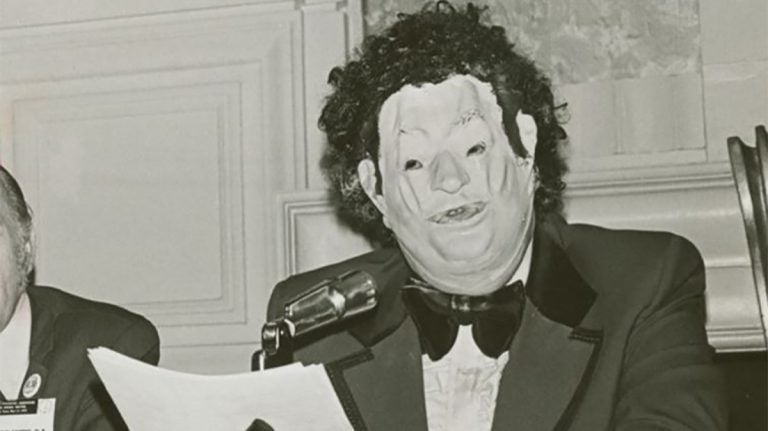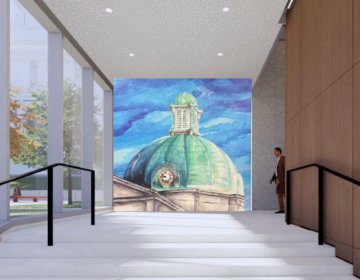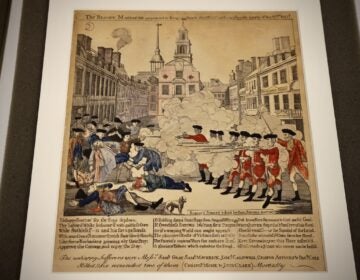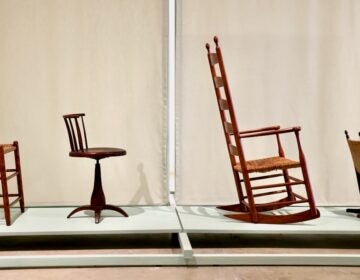Dr. Anonymous transfigured as Philadelphia gay rights pioneer and musician John Fryer
Listen
Dr. Anonymous at the American Psychiatric Association annual meeting in 1972. Photo by Kay Tobin
The Historical Society of Pennsylvania has invited New York-based playwright Ain Gordon to comb through its archives to find material for a new play, to premiere in May. Gordon has chosen to reveal the untold life of Dr. Anonymous.
Dr. Anonymous was the first American psychiatrist to stand against treating homosexuals as mentally ill. In 1972, homosexuality was officially listed in the Diagnostic and Statistical Manual of Mental Disorders. Openly gay people risked losing their jobs.
That year, at the annual conference of the American Psychiatric Association, a man wearing a Richard Nixon mask and a wig, speaking through a distorting microphone filter, identified himself as a gay psychiatrist and urged that homosexuality be removed from the DSM.
The next year, homosexuality was omitted from the list of mental disorders. Years later, that man was revealed to be John Fryer, a professor at Temple University (although some likely had their suspicions — despite his disguise, Fryer was hard to hide at 6’5 and weighing about 300 pounds).
After he died in 2003, 217 boxes of his personal papers were turned over to the Historical Society of Pennsylvania. The society recently invited Gordon to peruse its archive through its artist residency program, An Artist Embedded, funded by the Pew Center for Arts and Heritage. Gordon was tasked with finding a subject for a play within the millions of documents maintained and catalogued by the society.
“A lot of my work is about how history can be a fictive engine,” said Gordon. “At some point, somebody chooses something, somebody else assembles something, and somebody else hears it, and already three people have filtered the total truth into something receivable.”
In his play, to be called “The 217 Boxes of Dr. Anonymous,” three people from Fryer’s life try to piece together the man, in absentia: a LBGT activist with whom Fryer sometimes worked; his lifelong secretary; and his father. The character of Fryer does not appear onstage at all.
“That image — that singularly famous image of him — is an image which permanently obscured him,” said Gordon about the photograph of a disguised Fryer at the APA meeting. “The mask was more famous than the man behind it.”
While combing through the 217 Fryer boxes, Gordon discovered a cardboard box not filed with the others. It was on a high shelf, with “Fryer Add-Ons” handwritten in Magic Marker.
“I said, ‘What are those?'” Gordon remembered. “They said, ‘I don’t know what that is.’ They were not catalogued. They were things like tuning forks, the tape recorder he used to use for sessions, and this one reel-to-reel.”
The reel-to-reel tape had a recording of a gospel choir, likely from the now-defunct St. Peter’s Episcopal Church in Chestnut Hill, where Fryer was choir director. In addition to being a psychiatrist and LGBT activist, Fryer was a devout Christian and a lifelong musician. For years, he played the organ at Temple University’s graduation ceremonies.
Although he played a pivotal role in the history of gay rights, Fryer’s musical life is all but unknown. On Thursday, Gordon will showcase “The (Musical) Spark in My Life” at the historical society on Locust Street in Philadelphia. Playing excerpts from the tape, and introducing a live performance by the Arch Street United Methodist Church Choir, Gordon will be joined by Temple religion professor Rebecca Alpert, who was a friend of Fryer’s.
“Throughout his life, he talks about his quest for the transfigured self. Essentially, a rebirth into an elevated state,” said Gordon. “It was constant. He made to-do lists that said, ‘Buy batteries. Take your shoes to the shoe vendor. Quest for the transfigured self.'”
“That’s how his faith manifests in his life, to be something bigger and better and stronger than he knows how to be,” said Gordon.
Gordon is currently in rehearsals for “The 217 Boxes of Dr. Anonymous,” premiering at the Painted Bride on May 5. However, Fryer’s sacred music will not be part of that production. The tape will return to that “Fryer Add-Ons” box on a high shelf at the historical society.
WHYY is your source for fact-based, in-depth journalism and information. As a nonprofit organization, we rely on financial support from readers like you. Please give today.





